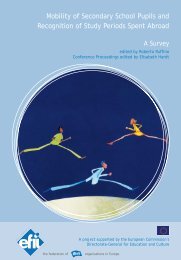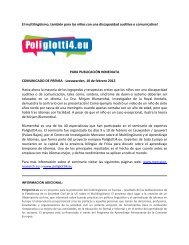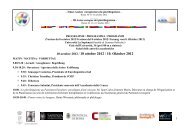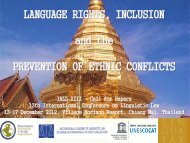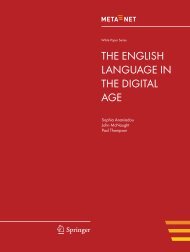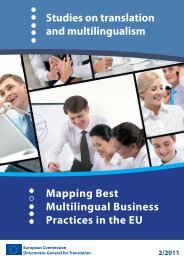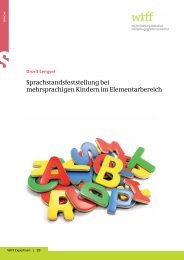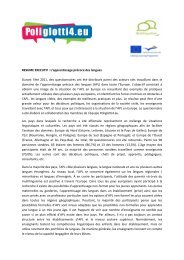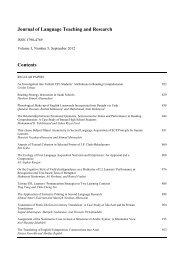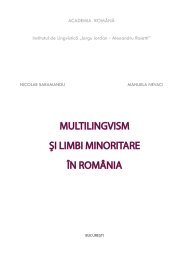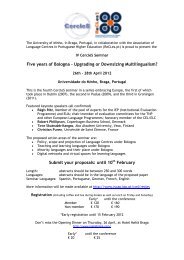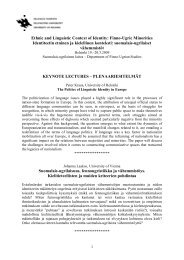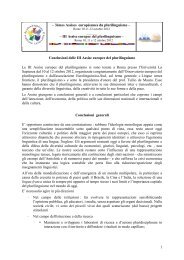FULL VERSION - European Commission - Europa
FULL VERSION - European Commission - Europa
FULL VERSION - European Commission - Europa
You also want an ePaper? Increase the reach of your titles
YUMPU automatically turns print PDFs into web optimized ePapers that Google loves.
The question of what role language testing should play in decisions made by member statesregarding migration, citizenship and social integration is a highly controversial issue. It is alsovery important to look at the issue of who decides what type of knowledge and skills shouldbe tested, who should be testing them, and on the basis of what evaluation criteria, if testersare to show regard for the rights of test takers and other stakeholders.A socially responsible and ethical approach to language testing is a pre-requisite in a worldwhere language testing plays an important role in social inclusion and exclusion in social,educational, academic and professional life.Issues to be addressed in the area of language testing and multilingualism include thefollowing: the consequences of language testing for immigrants and for the host society the impact of language testing on language pedagogy, teacher training anddevelopment the role of alternative approaches to testing and assessment, such as the use of theELP and self-assessment.4.2 Other initiatives in language education in support of multilingualismThe CLIL ApproachContent Language Integrated Learning (CLIL) has been successfully used in some <strong>European</strong>schools, though this educational approach (whose pedagogical practices have not beensystematically described) has been critiqued for being useful in schools for the elite and forthe promotion of English and other big <strong>European</strong> languages.With CLIL, there are a number curricular subjects –it depends on the school and thecurriculum– that are taught through the medium of a language other than the officiallanguage of the particular school system. Here, language is not merely the object ofknowledge; it is a means through which knowledge is accessed.The Intercomprehension ApproachAnother interesting proposal which has gained some ground is language pedagogy for thedevelopment of intercomprehension. Though ideally, this aim can be incorporated in anylanguage teaching and learning programme, there are few language teaching example togive language teachers tips on how to go about developing their students’ multilingualcomprehension (not necessarily multilingual production) competence, which is what theintercomprehension ‘approach’ is about. One of such best practice examples is described byHorst G. Klein, Franz-Joseph Meißner and Lew Zybatow, referring to a project developed inGermany called EuroCom 76 –an acronym for <strong>European</strong> intercomprehension in the three main<strong>European</strong> language groups (Romance, Slavic and Germanic) which most <strong>European</strong>s speakeither as their first, second or foreign language.The aim of the EuroCom method is to realistically enable <strong>European</strong>s to achievemultilingualism. What may be regarded as realistic is the acquisition of receptive competencein one language group, i.e. interlingual reading competence in all the languages of a group(or parts thereof). EuroCom intends to show learners that knowledge of their mother tongueand just one other foreign language they have learned arm them with an unexpectedly highlevel of advance knowledge, allowing them for instance to be able to rapidly understand thenews or technical texts in all other related (but not yet learned) languages. Othercompetences going beyond reading comprehension can then be subsequently developedfaster and more efficiently as required, although the necessary linguistic and languageteachingresearch have not yet been carried out. EuroCom has therefore initially76The EuroCom research group includes six universities, particularly in Germany. For more on the work of the research groupand links to the series of publications see the EuroCom homepage: www.eurocom-frankfurt.de. Also, see: Horst G.Klein/TilbertD. Stegmann, EuroComRom – Die sieben Siebe: Romanische Sprachen sofort lesen können, Aachen [Shaker], 2000, andGerhard Kischel/Eva Gothsch (ed.), Wege zur Mehrsprachigkeit im Fernstudium, Hagen [FernUniversität], 1999.Civil Society Platform on Multilingualism: 47Policy Recommendations for the Promotion of Multilingualism in the <strong>European</strong> Union 06/06/10 – <strong>FULL</strong> <strong>VERSION</strong>



